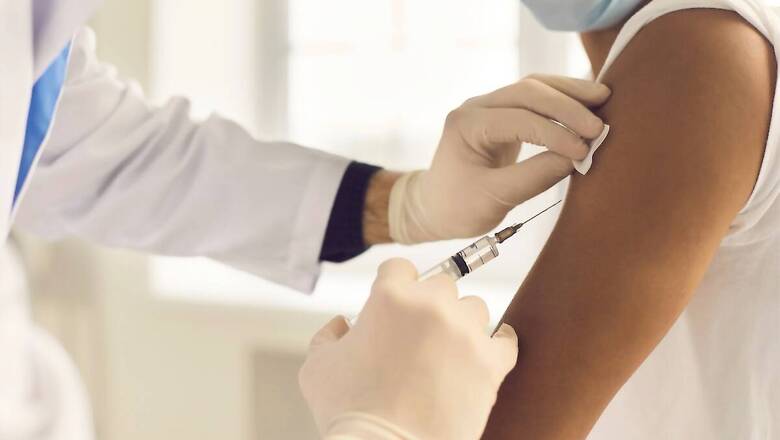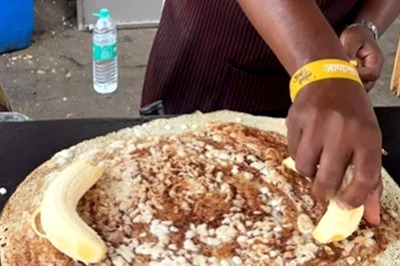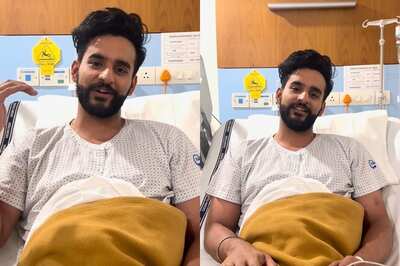
views
The column will be written by Dr. Chandrakant Lahariya (MBBS, MD), a Physician-Epidemiologist and a leading expert on COVID-19 disease and vaccines. In this fortnightly column, Dr. Lahariya will pick up one topic and give you tailored solutions, catering to the health needs of your entire family — kids, adolescents, adults, and senior citizens and all the other members of your family.
In this week’s column, Dr Lahariya has addressed the prevalent myths about vaccines that are propelling vaccine hesitancy, and some genuine concerns that people have about the vaccination.
Can the COVID-19 vaccine give me magnetic powers?
COVID-19 vaccines do not make a person magnetic, the way some of the viral videos on social media have shown. Experts have argued that it is very likely that those videos are trickeries by the individuals, to get attention or make their videos viral. Those individuals are likely to have used oil or other sticky material on the skin surface to hold the objects.
Scientifically speaking, COVID-19 vaccines do not contain ingredients that can produce an electromagnetic field in the human body or injection sites. In addition, COVID-19 vaccines are free from metals such as iron, nickel, cobalt or microelectronics, carbon nanotubes, semiconductors, etc. (It is hilarious that I have to give this explanation!).
More importantly, we need to remember that the COVID-19 vaccine is administered in a meagre quantity of 0.5 ml, so even if that much quantity of pure metal is injected into human body, it may make a person sick but would not make him/her magnetic.
Can the COVID-19 vaccine affect women’s fertility?
The vaccines do not cause infertility, either in males or females. All licensed vaccines and their constituents are tested first on the animals and then on humans (in multi-phase clinical trials) to assess if they have any side effects. Vaccines are authorized for use only after those are found to be safe and effective. Each COVID-19 vaccine has undergone clinical trials on 20,000 to 35,000 people, and since then, more than 2 billion doses have been administered globally, including 350 million in India. There is no evidence that a COVID-19 vaccine (or any other licensed vaccine) impacts fertility in any way.
Since COVID-19 vaccines have only got emergency approval, their safety and effectiveness cannot be trusted. Is it true?
COVID-19 vaccines are safe and effective and that can be trusted. It is true that some of the administrative processes were expedited; however, there was no compromise on the process to be followed in the clinical trials. The safety of vaccines is assessed at every stage of clinical trials and efficacy in phase 3 of trials. The vaccine developers have used similar and even larger sample sizes for clinical trials of COVID-19 vaccines than for many previously licensed vaccines.
Since the Emergency Use licensing (EUL), the vaccines have been administered to millions of people worldwide, and there is no major concern with COVID-19 vaccines. However, we need to remember that every vaccine has a few minor or non-serious adverse events. However, the benefit of vaccination is far higher than minimal risk associated. On efficacy, globally a benchmark of 50% efficacy has been set up. And all vaccines given EUL have met this benchmark. Most vaccines have an efficacy of around 75% or higher. The threshold of 50% is met for even emerging variants.
Are the side effects of the COVID-19 vaccine dangerous? Can it cause death?
We need to remember that vaccines are external substances injected into the human body. Their role is to activate and train the immune system to protect from future infections and disease. Therefore, most vaccines mimic early symptoms of natural infections (without the risk of severe disease). These symptoms may include fever, fatigue, lethargy and injection site pain etc. These are termed as Adverse Event Following Immunization (AEFI). This kind of minor effect and a very few rare serious adverse effects (all of which can be managed) are far lower than the benefits vaccines provide. Furthermore, it is well known that the risk of dying following vaccination is negligible compared to the known risk of dying due to COVID-19.
Does the COVID-19 vaccine contain a microchip to track the population?
The answer is no. There is no microchip in COVID-19 vaccines. This is amongst many baseless conspiracy theories about COVID-19 vaccines around the world. The vaccine scientists and experts have already explained that the COVID vaccine does not contain any metal or microchip or has a magnet-like effect producing electricity.
Is it true that the COVID-19 vaccine will alter my DNA?
No, this is not true. None of the COVID-19 vaccines can alter human DNA or the genetic code of any human. Currently, licensed COVID-19 vaccines activate our immune system to produce antibodies through a range of approaches. Though, some of these approaches have been used for the first time in vaccine development (mRNA, viral vectored and Plasmid DNA); however, these are entirely safe and do not have any ability to influence or modify human DNA. The vaccine material enters the human cell, but it does not enter the human cell’s nucleus. Therefore, the vaccine cannot interact with our DNA in any which way.
Also, mRNA vaccines don’t carry the enzymes through which they can integrate with the human DNA, so there is no risk of the genetic material. Experts have closely examined these aspects, for many years and decades and concluded that vaccines can not alter human DNA.
Can the first vaccine dose give me enough antibodies against COVID-19?
A few COVID-19 vaccines, such as mRNA vaccines and viral vectored vaccines can provide some protection after a single dose, which can last for a few weeks. A few more vaccines are being considered for licensed for just one dose only. However, there is no data available on the effectiveness of inactivated vaccines after a single dose. Till more scientific evidence becomes available, it is essential that people adhere to the vaccination schedule and take the second dose, as per recommended schedule, to realize the full benefit of vaccination.
Can the vaccine give a person COVID-19?
None of the authorized/licensed vaccines has a live virus that can infect a person and cause COVID-19. However, since a vaccine dose takes 2-3 weeks after vaccination for the body to build immunity, it’s possible a person could be naturally infected with the virus that causes COVID-19 just before or just after vaccination and still gets sick. This is because the vaccine has not had enough time to provide protection, but that does not mean the vaccine gave or made the person sick with COVID-19.
Will the pandemic get over since we have started taking vaccines now?
Vaccination of as much population as possible is considered an important way to reduce the impact of the virus. However, for the pandemic to get over, the transmission of the virus needs to be halted, in all parts of the world. That requires developing population-level immunity (where vaccination would help) and adopting COVID appropriate behaviour (which will break the chain). We need to focus on both.
Does the vaccine contain animal ingredients?
A few vaccines (and not all) undergo a process in which the vaccine material is grown on specific cells grown in a laboratory, using animal products. However, those animal products are not included in the finished vaccine material, administered to human beings.
Can one get a second shot of a different vaccine?
In India, at present, the interchangeability of vaccines is not allowed. One has to get the second shot of the same vaccine which was administered as the first shot. However, a few studies have been conducted in Spain and the UK, where the safety and immunogenicity of different vaccines for first and second shots have been studied. The Oxford/Astra Zeneca and mRNA vaccines have been used interchangeably and found to be safe and immunogenic. Several countries have started and approved the use of a different vaccine for the second shot.
Can COVID-19 vaccines be administered to pregnant women?
On 2 July 2021, the government of India has approved the use of COVID-19 vaccines for pregnant women. Evidence has emerged that pregnant women have a higher risk of severe disease and adverse pregnancy outcomes such as preterm delivery. Therefore, it has been recommended that the benefit of vaccination in pregnant women is far higher than any possible risk. The COVID-19 vaccines are also recommended for breastfeeding mothers.
The vaccination of the lactating mothers can indirectly benefit the breastfeeding child as mother’s milk secret Immunoglobulin A (IgA), which can also protect the child. Therefore, both pregnant women and breastfeeding mothers are recommended to receive COVID-19 vaccines.
Read all the Latest News, Breaking News and Coronavirus News here.


















Comments
0 comment